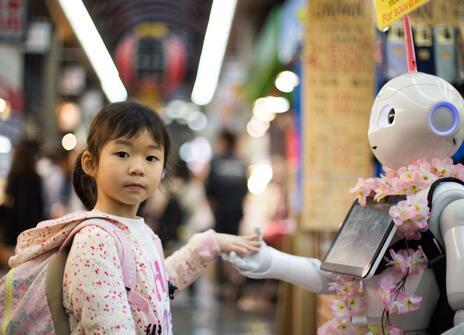Do machines need emotional intelligence? And how can we create technology that behaves in a socio-emotionally intelligent way?
Watch the Q&A here: https://youtu.be/_IiyTD0Ogyc
Subscribe for regular science videos: http://bit.ly/RiSubscRibe
Join Hatice Gunes as she explains why socio-emotional intelligence for artificial systems is not a luxury but a necessity.
In this talk, Hatice focuses on the different components of artificial social intelligence, including perception, learning, action and adaptation, while demonstrating representative examples of such technology in action.
This Discourse was recorded at the Royal Institution on 24 June 2022.
00:00 Introduction – what is emotional intelligence?
05:01 How are our emotions expressed?
09:25 How humans attribute emotions to technology
14:39 Examples of emotionally aware tech
20:03 Turning the London Eye into empathetic architecture
24:17 Creating cognitive training
30:35 Giving robots emotional intelligence
39:50 Creating robo-waiters
46:39 The future of emotionally intelligent robots
49:10 The difference between human and robot intelligence
Prof Hatice Gunes is a Professor of Affective Intelligence and Robotics at University of Cambridge's Department of Computer Science and Technology. Prior to joining Cambridge in 2016, she was a Lecturer, then Senior Lecturer in the School of Electronic Engineering and Computer Science at Queen Mary University of London, a postdoctoral researcher at Imperial College London, and an honorary associate of University of Technology, Sydney. Her research interests are in the areas of affective computing and social signal processing that lie at the crossroad of multiple disciplines including, computer vision, signal processing, machine learning, multimodal interaction and human-robot interaction.
Her current research vision is to embrace the challenges present in the area of health and empower the lives of people through creating socio-emotionally intelligent technology. This vision is currently supported by three new projects funded by prestigious and competitive grants via the WorkingAge Project funded by the EU H2020 Programme (2019–2022), the EPSRC Fellowship Programme (2019–2024) and the Turing Faculty Fellowship Programme (2019–2022).
----
A very special thank you to our Patreon supporters who help make these videos happen, especially:
Andy Carpenter, William Hudson, Richard Hawkins, Thomas Gønge, Don McLaughlin, Jonathan Sturm, Microslav Jarábek, Michael Rops, Supalak Foong, efkinel lo, Martin Paull, Ben Wynne-Simmons, Ivo Danihelka, Paulina Barren, Kevin Winoto, Jonathan Killin, Taylor Hornby, Rasiel Suarez, Stephan Giersche, William Billy Robillard, Scott Edwardsen, Jeffrey Schweitzer, Frances Dunne, jonas.app, Tim Karr, Adam Leos, Alan Latteri, Matt Townsend, John C. Vesey, Andrew McGhee, Robert Reinecke, Paul Brown, Lasse T Stendan, David Schick, Joe Godenzi, Dave Ostler, Osian Gwyn Williams, David Lindo, Roger Baker, Greg Nagel, Rebecca Pan.
---
The Ri is on Patreon: https://www.patreon.com/TheRoyalInsti...
and Twitter: http://twitter.com/ri_science
and Facebook: http://www.facebook.com/royalinstitution
and TikTok: https://www.tiktok.com/@ri_science
Listen to the Ri podcast: https://anchor.fm/ri-science-podcast
Our editorial policy: https://www.rigb.org/editing-ri-talks...
Subscribe for the latest science videos: http://bit.ly/RiNewsletter



